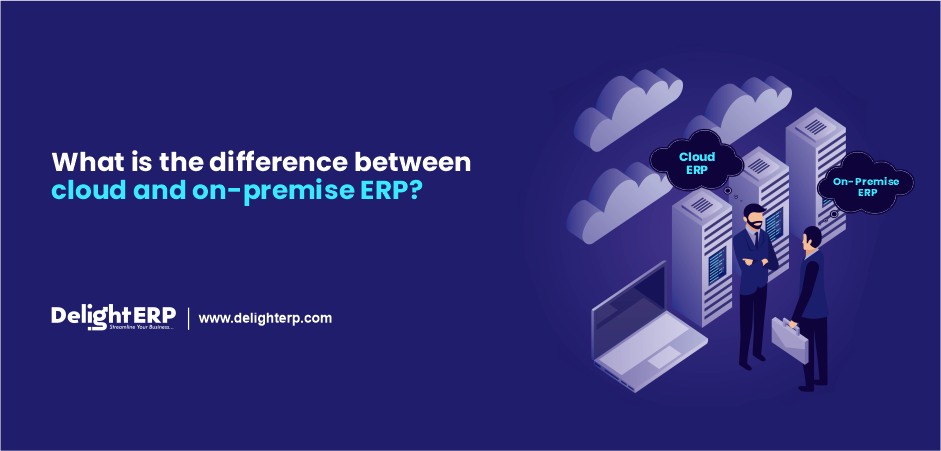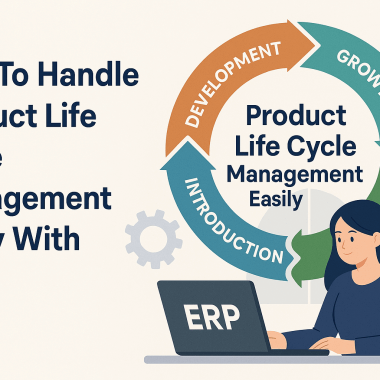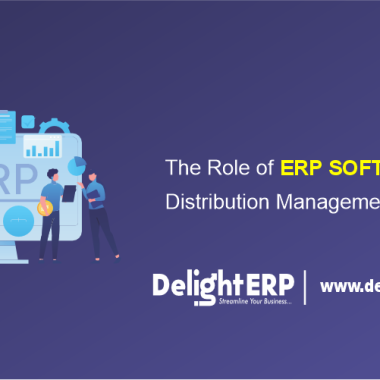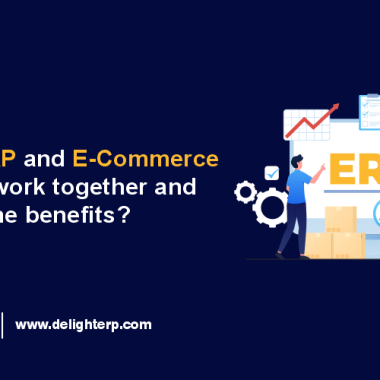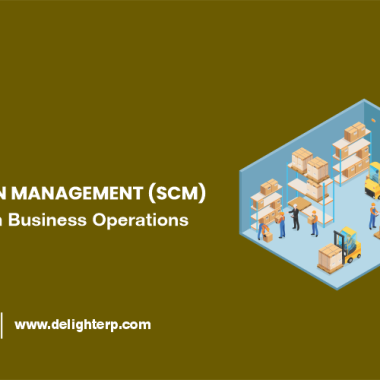Introduction
Companies are now adopting effective ERP Software for their growing business. Advanced technologies like AI, IoT, data analytics, and global competition have together established the need for more transparent business processes. They have also required increasingly extensive data collection, leading companies to acquire new ERP software with the efficiency to handle these features or upgrade their systems accordingly.
Enterprise resource planning (ERP) software is a system that helps organizations to automate and manage important business processes for maximum performance. ERP solution coordinates the flow of data between a company’s business processes, providing a particular source of truth and streamlining operations across the enterprise.
At the time of selecting the ERP system, you may get confused about cloud ERP and on-premise ERP systems that will suit you best. The best thing to start with is to analyze business requirements specific to the company. It makes it easier to sort through the various vendors offering different levels of services. But you do not get a clear idea that the type of ERP deployment model you choose can have a significant impact on your business.
Difference between cloud ERP and on-premise ERP.
Let us first understand the meaning of on-premises ERP and cloud ERP.
Definition: On-premises ERP
On-premise ERP software is enterprise resource planning software that runs on internal servers at your location or the locations under your control. It means everything from implementation to use happens in-house.
Although, maintenance, safety, and updates are in-house tasks. The company installs the software it purchases on its server and often requires to invest in additional database software, powerful servers, and operating systems. As there’s no third-party ownership, a company using on-premise software assumes total ownership.
Definition: Cloud ERP
Cloud ERP is enterprise resource planning software that is available over the internet. As the IT backbone of a company, cloud ERP software provides advanced functionality for all the main processes in an organization.
Hosted on a provider’s cloud computing platform, cloud ERP is typically delivered “as a service” (software-as-a-service or SaaS ERP). Here customers don’t own the software, but instead, lease it on an annual or monthly subscription basis. There are no upfront hardware costs- and the vendor takes care of application maintenance, upgrades and innovations, data storage, and security.
Particular computer system resources are on-demand, and cloud computing aims to provide them. One defining component is that there’s no active management, and there are often applications such as processing power and storage.
There’s usually a web portal where users can access vendor-hosted information. In order not to share resources, customers may opt for a dedicated private cloud option. They can demand backup control, more customization, and upgrades. Yet, a shared cloud guarantees 100% privacy of the client’s data, even if multiple tenants share the cloud service. Also, shared cloud options are economical but require customization options.
1. Ownership Cost.
On-premise ERP software mostly needs large upfront and ongoing investments to purchase and manage the software and the related hardware, services, and facilities necessary to run it. If your company doesn’t have a large or experienced IT staff, you may also have to invest more time and money in extra personnel and training.
Especially, on-premise systems need that your IT team spends an important amount of their time and budget making sure your system is up and running when you need it, including maintenance of hardware, server rooms, and more.
When it’s time for your ERP system to be upgraded, IT must then redeploy the system across several users’ computers and re-execute several customizations and integrations that your business installed on your previous software.
For cloud-based ERP, starting costs are generally much lower because you simply implement the software as per your requirements and then access it through your computer’s internet connection. The cloud ERP provider hosts and maintains all of the IT infrastructure for you, make sure the system is always running, that the data is secure, and that product enhancements are rolled out effortlessly to your solution without breaking your previously implemented customizations.
Eventually, this all permits your IT resources to focus on innovating and helping grow the business more productively, rather than spending an unreasonable amount of their time on maintaining and managing your on-premise systems. Cloud ERP also offers an anticipated, pay-as-you-go subscription model that can make cash flow management and planning much easier. With time, those IT savings add up.
2. Better system performance and accessibility.
Cloud ERP mostly delivers improved performance than on-premise solutions. Cloud software architecture is designed from the ground up for the greatest network performance, which can mean improve application availability than standard on-site ERP systems.
Cloud-based ERP also offers improved performance that can adapt to your needs. If there is a spike in your business, cloud ERP automatically adjusts and dynamically supplies additional resources to handle the surge.
It’s also essential to note that a cloud-based ERP solution provides real-time data that can be reachable via the Internet anywhere at any time. That means that staff at your company can see perfect information on laptops, smartphones, and tablet devices while they travel or telecommute—all without extra setup fees or ongoing costs.
Not only can cloud-based ERP provide improved performance and greater accessibility, but improved security as well. They offer industry-standard data security certifications that concur with PCI DSS and SAS 70 standards. In contradiction, their security, data recovery, and backup procedures are more affordable than on-premise ERP software.
3. System Upgrades and Enhancements.
On-premise ERP software can be customized, but those customizations are attached to your current software deployment and are not simple to re-implement with future versions. As your ERP provider delivers new product updates and enhancements, your earlier implemented customizations will be wiped out when you upgrade and your IT team will have to start customizing from scratch again.
That’s the major reason many companies simply avoid upgrading their on-site ERP software and just settle for running their business on out-of-date technology. Two-thirds of mid-size businesses are running on old versions of their ERP software.
In contrast, cloud ERP solutions are continually customized by the provider so you can be sure you’re always using the latest, most advanced version of your ERP software. Because of the cloud platform today’s prime cloud applications are built upon, your previously implemented customizations and integrations automatically carry forward when the solution is updated without additional investment.
4. Mobile access.
One can access on-premise ERP systems locally, but this generally needs a mobile device and third-party support to access the solution. As there may be attendant security and communication issues, it’s important to implement stringent security measures if employees will be using files on personal devices.
Although the cloud is different, you will generally need an internet connection to use your data from a mobile device. It makes flexibility and mobility two of the distinctive features of cloud systems. Because your employees can access company resources from any place, a cloud ERP system results in higher engagement rates.
5. Deployment of speed.
ERP deployment takes time and requires careful planning, but cloud ERP offers clear benefits when you consider the speed of deployment. Since cloud ERP requires no additional hardware, your business doesn’t have to delay procuring and installing IT infrastructure. With cloud ERP, you can smoothly roll it out across multiple regions, subsidiaries, and divisions, avoiding the cost associated with those rollouts.
If you chose a cloud-based ERP system, these differences can add up to important time savings: Cloud ERP deployments usually take 3-6 months as compared to the 12 months that it generally takes to implement an on-premise solution.
Cloud-based ERP systems are also simple to scale, giving you the flexibility to add more users as your business grows. On-site ERP solutions don’t offer the same privilege—to give more employees access to an on-site system, it’s often necessary to provision additional hardware.
Advantages of using on-premise ERP:-
- The total cost of ownership is lower as compared to recurring payments.
- Companies have full control and ownership of the hardware, data, and platform.
- Zero reliance on external servers for connectivity.
Disadvantages of using On-premise ERP:-
- A substantial upfront capital cost, besides support and operational costs.
- Maintenance rests forthright on the shoulders of the company.
- Deployment is slower than cloud ERP as it involves installation on multiple servers and workstations.
Advantages of using Cloud ERP software:-
- Cloud software offers high accessibility.
- Zero upfront costs to retain cloud ERP affordably.
- There are no maintenance responsibilities on the part of the customer.
- Cloud ERP providers use the highest security standards.
- Cloud ERP offers speedy deployment.
Disadvantages of using Cloud ERP:-
- Productivity in using cloud ERP software depends on having continuous connectivity to reliable internet.
- The total cost of ownership of the cloud ERP solution might be higher than an upfront cost spread over the system’s period.
- Sometimes, difficult development requires necessary but is not suitable for a cloud solution.
Conclusion
There are many ERP software for businesses of every size, and cloud-based deployment permits small businesses to access these services. The benefits are important, but customization and potential security concerns are equally substantial.
On-premise systems keep addressing these concerns with support for customization and control. Although the initial high cost will put off companies with a limited budget. The final choice for any company eventually depends on its present needs and financial capacity.
Delight ERP is the best custom ERP software development company in Rajkot, Gujarat, India. Delight ERP software is a significant cloud-based system. This ERP software development is done for small, medium, and large-sized enterprises with the latest technology.

